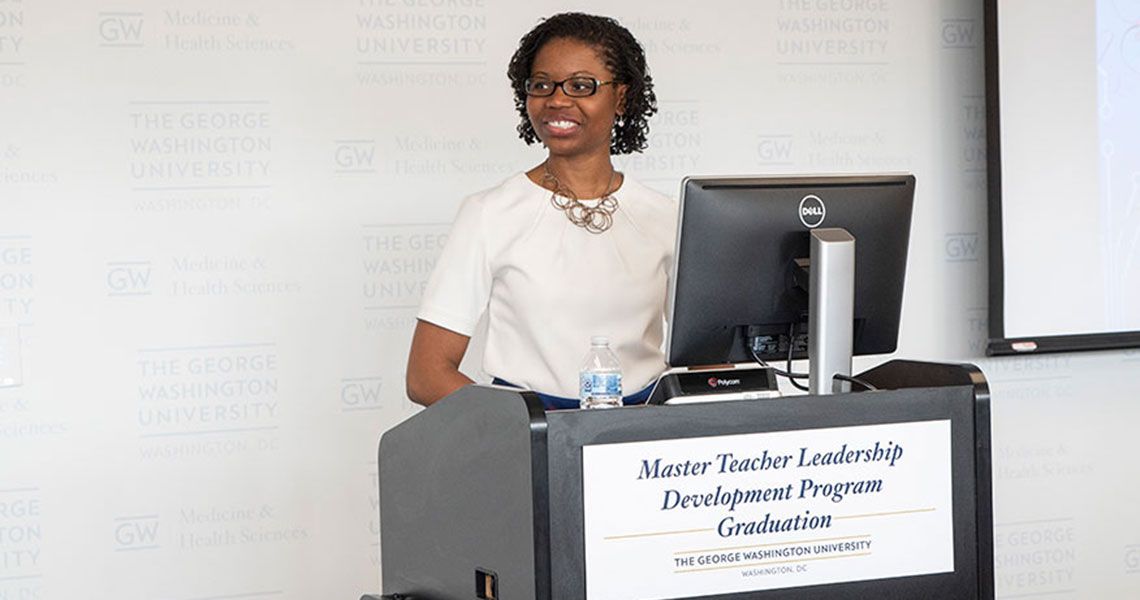When Juliet Lee, MD, MA ’17, joined the 10th cohort of the Master Teacher Leadership Development Program, she had already been teaching in the George Washington University (GW) School of Medicine Health Sciences’ (SMHS) surgery residency programs and medical school, but she wanted to take the next step in gaining new skills and instruction in education and leadership.
“I was interested in Master Teacher also because I knew I would be taught by expert educators,” said Lee, assistant professor of surgery at SMHS. “They allowed us to develop our skills in a practical way. I’m a surgeon, so I like juxtaposing theory and practice all the time, so that was important to me.”
The innovative, year-long faculty development program, developed in 2002 as a partnership between GW’s Graduate School of Education and Human Development (GSEHD) and SMHS, is designed to enhance teaching skills, develop educational leadership potential, and promote scholarship in education.
The 16th cohort of the Master Teacher Program celebrated graduation June 13, with the 12 members sharing their experiences in front of family, friends and colleagues. This year’s cohort consisted of six faculty or staff members from SMHS, five from Children’s National Health System (Children’s National), and one from the DC Veterans Affairs Medical Center.
“Year after year, the Master Teacher program has produced graduates who will make a real impact across GW in academic innovation and leadership,” said Raymond Lucas, MD, senior associate dean for faculty affairs and health affairs at SMHS. “I am proud of all this program has accomplished, and look forward to many successful years to come.”
While the program has remained consistent in many ways, such as the number of cohort members each year, in other ways it has evolved. In the beginning, it was heavily oriented toward adult learning theory. In subsequent years, more content on leadership and leadership development were added to the curriculum, as well as the addition of content on instructional design, course design, and assessment of learning.
The program also provides an avenue for graduates to apply their certificate credits toward a full master’s degree in education and human development from GSEHD, which Lee took advantage of, graduating with her MA in Education and Human Development in 2017. “The Master Teacher program definitely helped lead me down that path. I wanted that complete body of knowledge. The degree afforded me the opportunity to learn new techniques and push myself further,” she said.
The cohorts also have grown more diverse, expanding from medical faculty only to professionals from the basic sciences, health sciences, nursing, and librarians.
“There’s also diversity of age and gender. So, when you get in the room, you have rich experiences coming from different angles,” said Andrea Richards Scott, EdD, manager of the Master Teacher Leadership Development Programs. “We have people who are in residency [and] fellowship, and then we have people who’ve worked here for 30 years.”
Heather Walsh, MSN, RN, simulation program manager at Children’s National, first heard about the program in 2007, when she was six months pregnant and only six months out of graduate school. Going back to school wasn’t something remotely on her mind, but she recognized the program offered an opportunity she couldn’t pass up.
Now, a decade later, Walsh said she uses what she learned in the program every day. “That experience has impacted the way I practice clinically and as an educator in almost every way,” she said.
In addition, Elizabeth Ruckert, DPT, assistant professor of health, human function, and rehabilitation sciences at SMHS, a graduate in the 11th cohort, said the program is a valuable asset to GW.
“I was so lucky to have had the chance to do this and have dedicated time to think about the theory of good instructional design, to think about the scholarship of teaching and learning, and to understand how academic organizations work from a big picture perspective,” she said.



